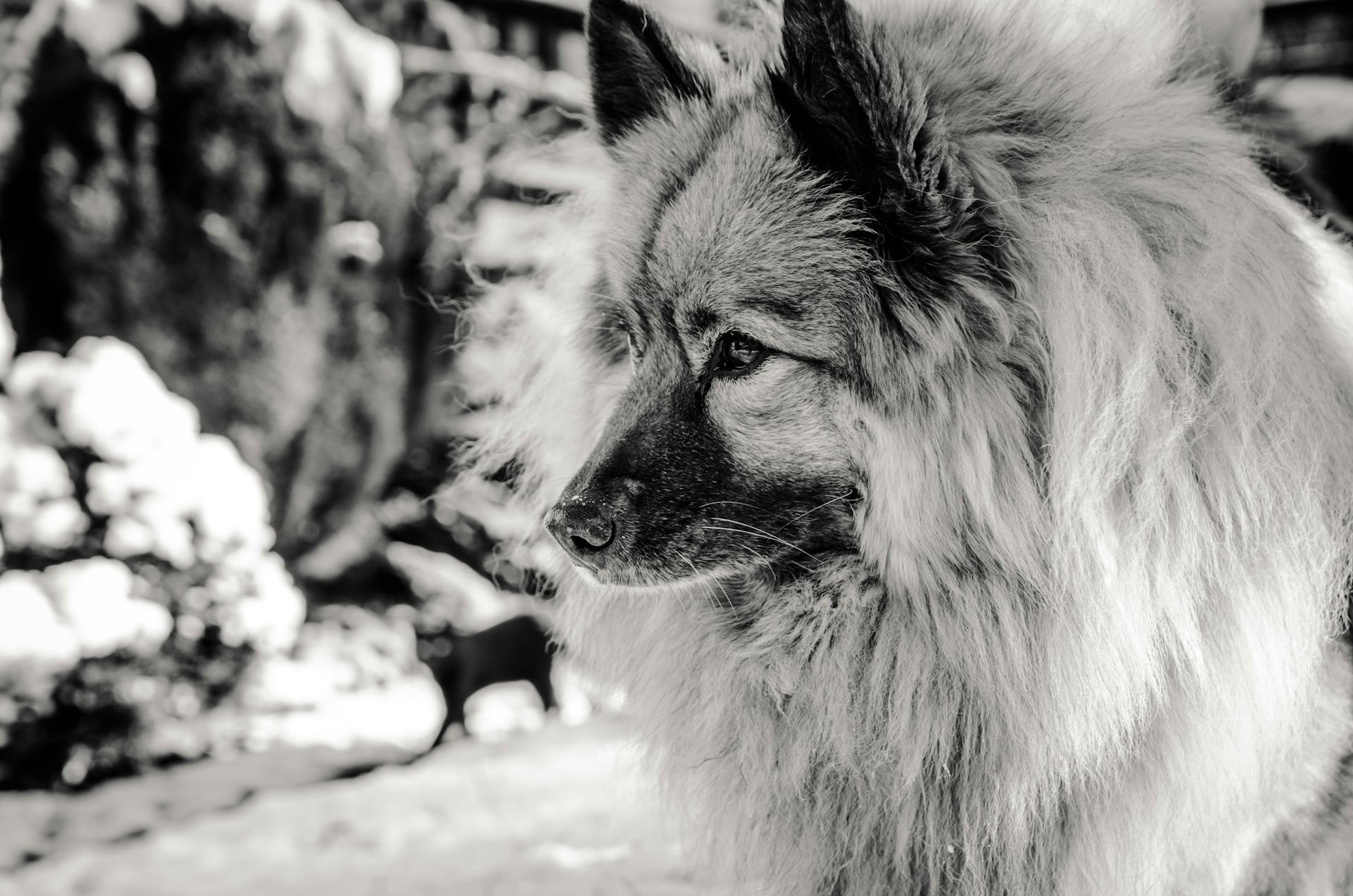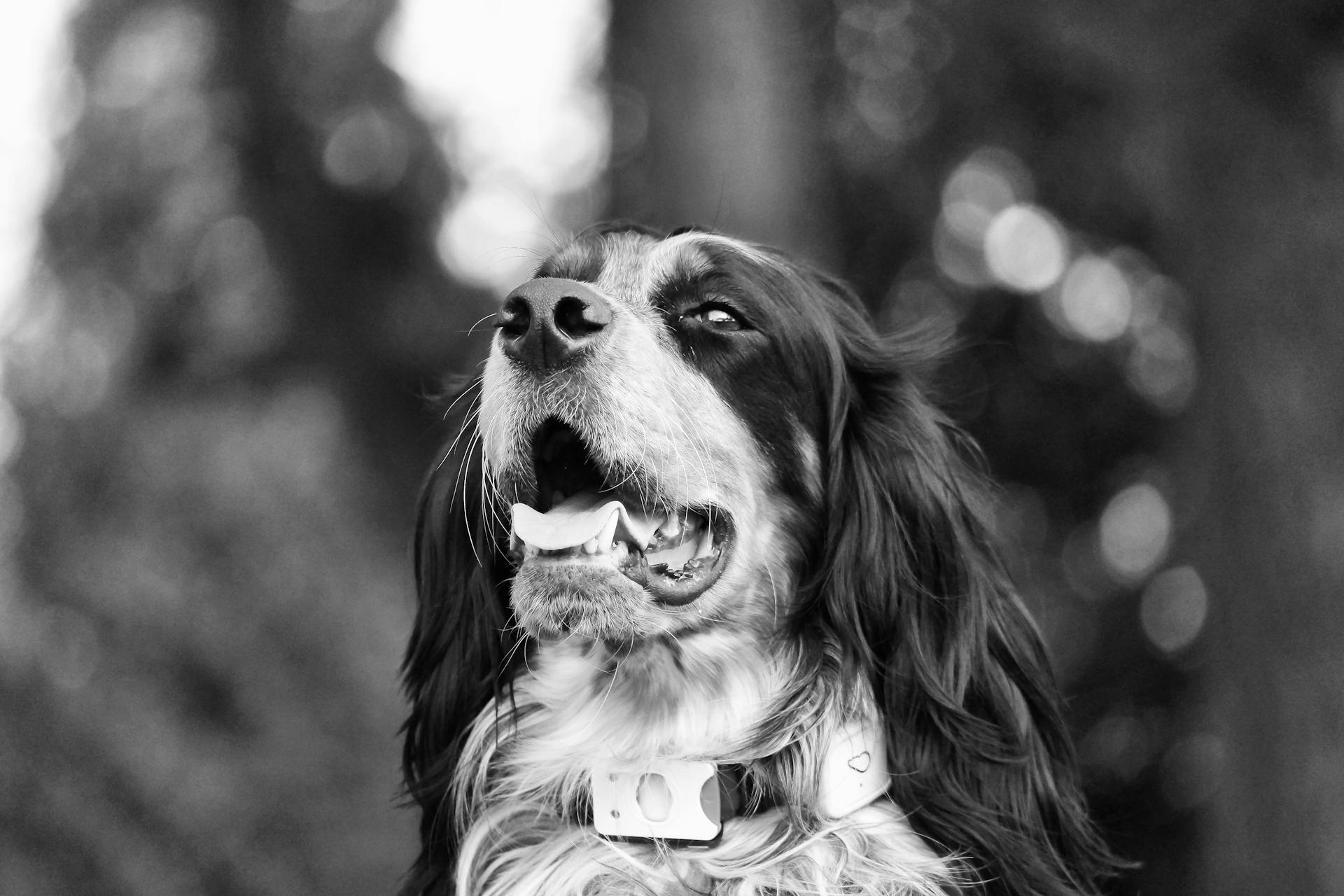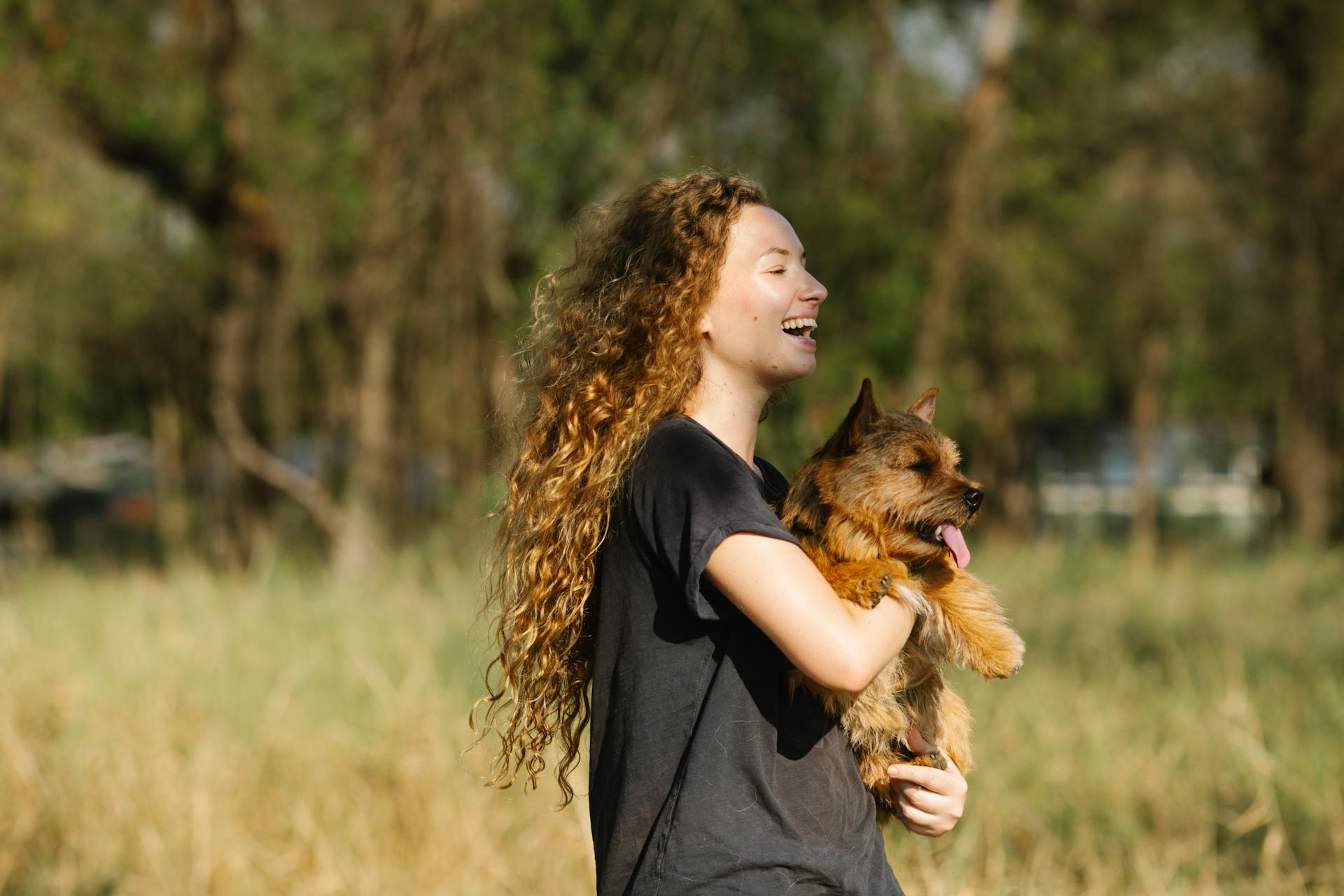
Adult Boston Terriers are a joy to own, but they do require some special care. Adult Boston Terriers can live up to 12-15 years with proper care and attention.
As you consider bringing an adult Boston Terrier into your life, it's essential to remember that they are a relatively small breed, typically weighing between 10-25 pounds.
Adult Boston Terriers are prone to certain health issues, such as patellar luxation and brachycephalic syndrome, which can be managed with regular veterinary check-ups and a healthy lifestyle.
They are also known for their short, easy-to-maintain coats, which require minimal grooming.
Care and Health
Boston terriers are a relatively low-maintenance breed, but they do require regular exercise, grooming, and training. They thrive on attention and want to be with their owners as much as possible.
To keep your adult Boston terrier healthy, schedule annual visits to the veterinarian and feed them high-quality dog food. They also need plenty of exercise to stay happy and healthy.
Additional reading: How Much Exercise Does a Boston Terrier Need
Some common health issues in Boston terriers include eye problems like cataracts, corneal ulcers, and glaucoma. Deafness, patellar luxation, and brachycephalic syndrome are also potential concerns. To prevent or manage these issues, keep an eye out for signs of redness or irritation in your dog's eyes, and check with your vet about joint supplements and pain medication.
Here's a quick rundown of some of the common health issues in Boston terriers:
Remember to always check with your veterinarian for specific advice on caring for your adult Boston terrier, as they can provide personalized guidance based on your dog's individual needs.
Health
Boston terriers are prone to some health issues, so it's essential to be aware of them. A life expectancy of 11-13 years is average for this breed.
Their large, prominent eyes can be prone to dryness and irritation from dust, pollen, or low humidity. You should check your Boston terrier's eyes daily for any signs of redness or irritation.

Deafness is a common issue in Boston terriers, especially congenital deafness in one or both ears. Be aware of this potential issue, especially if you notice your dog isn't responding to sounds.
Patellar luxation, an inherited condition, causes the kneecap to slip out of place. This can lead to limping, odd leg movements, and sometimes pain in advanced cases.
Brachycephalic syndrome is a combination of upper airway abnormalities that cause breathing difficulties. This can be due to their smooshed face, leading to noisy breathing, snoring, or more severe signs.
Here are some common health issues to be aware of:
Annual eye tests are recommended to catch cataracts and other eye issues early. Regular check-ups with your vet will help prevent and manage these health issues.
For your interest: Boston Terrier Eye Problems
How to Care for
To keep your Boston Terrier healthy, make sure to visit the veterinarian annually. Feed them high-quality dog food and give them plenty of exercise.

Annual visits to the veterinarian are crucial to keep your Boston Terrier healthy. You should also discuss the amount and type of food with your veterinarian to ensure you're meeting your dog's individual needs.
Boston Terriers typically do well on a high-quality commercial dog food, and you should factor in your dog's age when choosing a formula. Be sure to consult with your veterinarian to nail down a feeding chart.
Feed your Boston Terrier by using a puzzle toy or special bowl that slows them down to prevent gassiness. You can also consider changing up their food and ruling out any food allergies with your veterinarian's help.
Treats are excellent in training, but they still count as calories. Make sure to balance treats, meals, and exercise to keep your Boston Terrier at a healthy weight.
Regular exercise, grooming, and training are necessary for Boston Terriers, but they require less than many other breeds. If left alone too often, they can become destructive or develop annoying behaviors.
Expand your knowledge: Healthy Bull Terrier
Exercise
Adult Boston Terriers need about an hour of exercise per day to stay happy and healthy.
They're relatively energetic, so a couple of daily walks, games of fetch, and playing with puzzle toys are a great start. Running around in a secure area can also be a wonderful way to burn off energy.
Boston Terriers are big snugglers who love to be with their people, so they'll happily follow you around the house. They need both physical and mental stimulation, so don't just leave them to their own devices.
A good walk and daily play are great for their physical exercise needs, but don't forget to include activities to engage their brains, like puzzle toys and training games.
Due to their flat face, Boston Terriers are prone to breathing issues, so be sure to discuss this with your vet and know how to spot the signs of labored breathing during exercise.
Take a look at this: Why Does My Boston Terrier Lick Me so Much
Grooming
Grooming is a breeze for adult Boston Terriers. Their short coat requires minimal maintenance, and a weekly brush with a soft-bristle brush or grooming mitt should do the trick.
Take a look at this: Best Brush for Boston Terrier
They don't shed much, so a quick weekly brushing session will keep their coat looking healthy and shiny. You can also use a grooming glove for a gentle and efficient grooming session.
You'll want to bathe your Boston Terrier about once a month, unless they get dirty outside. This will help keep their coat clean and prevent any unpleasant odors.
Their nails grow at different rates, but you'll typically need to trim them every two to four weeks. Listen for the tapping sound on hard surfaces to know it's time for a trim.
Here's a quick rundown of their grooming needs:
- Brush weekly with a soft-bristle brush or grooming mitt
- Bathe once a month (or as needed)
- Trim nails every 2-4 weeks
- Check ears weekly for wax buildup and clean as needed
- Brush teeth daily for good dental health
By following these simple grooming tips, you'll be able to keep your adult Boston Terrier looking and feeling their best.
Owner and Family
Boston Terriers are perfect for first-time owners who enjoy training and are around most of the day, as they thrive on attention and interaction.
They make good family dogs, joining in with family games and being friendly and social, but they do better with sensible, older children as they can be prone to eye injuries.
Worth a look: Are Pit Bulls Good Family Dogs
As a lively and happy dog, the Boston Terrier loves human company and makes an affectionate pet, but they can be boisterous and care must be taken that games are not too rough.
Boston Terriers are devoted and sensitive to their family's wishes and moods, and they are well-mannered indoors but can be saucy and playful when the chance arises.
Ideal Owner
If you're considering bringing a Boston Terrier into your life, you'll want to be aware of their needs and characteristics. They thrive on human interaction and attention, so owners should be prepared to spend quality time with their pet.
Boston Terriers are perfect for first-time owners who enjoy training and are around most of the day. This breed requires regular interaction to prevent boredom and destructive behavior.
Their short-nosed breed can lead to costly vet bills, so owners must be prepared for potential health issues. Regular check-ups and preventative care can help mitigate these risks.
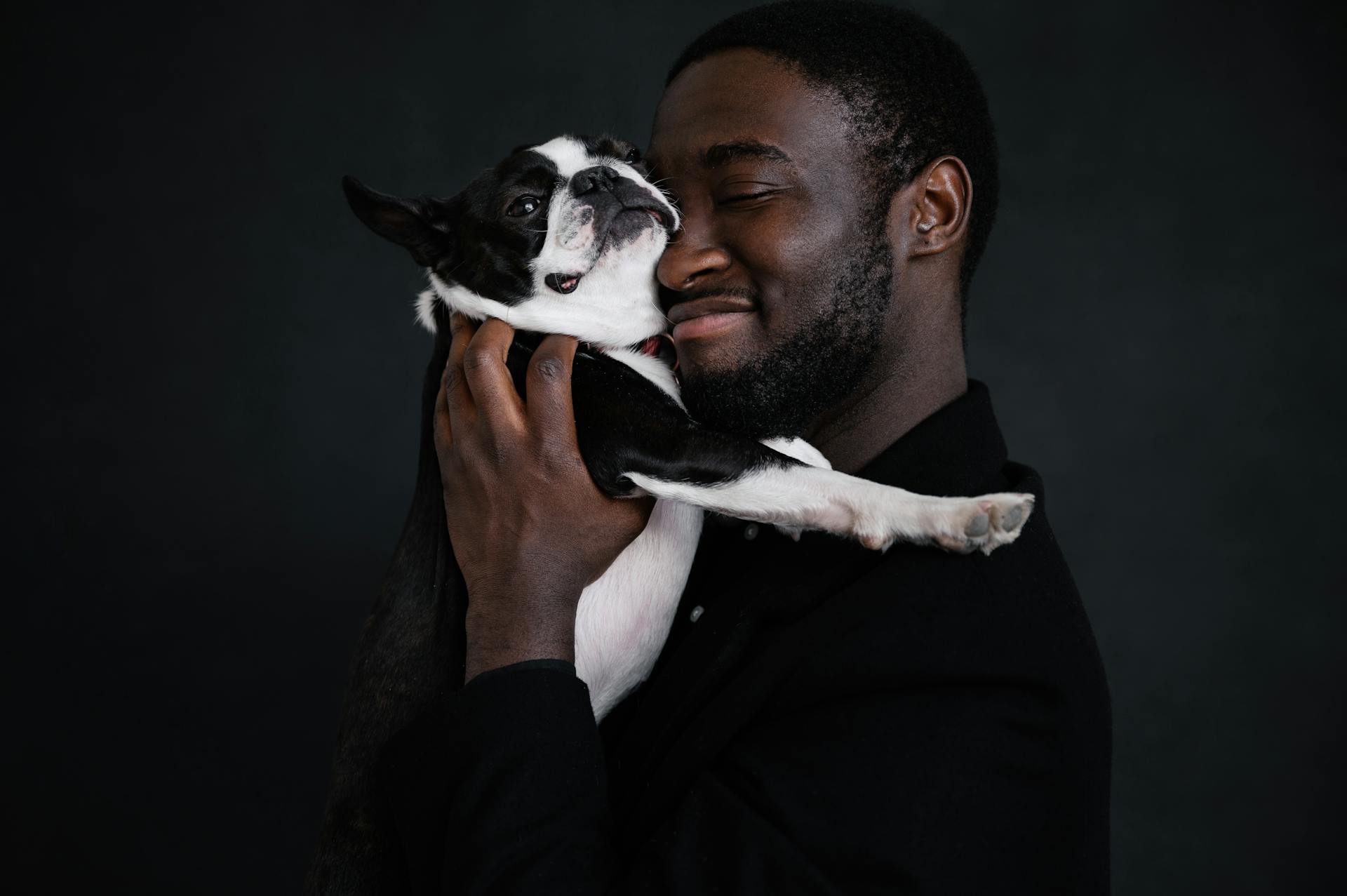
Boston Terriers are generally good with children, but they can be prone to eye injuries, so owners with young kids should be extra cautious. Supervising interactions between dogs and young children is crucial to prevent accidents.
They're also not suitable for owners who are away from home for extended periods, as they can become anxious and destructive. Leaving them alone for too long can lead to behavioral problems.
Ultimately, Boston Terriers make wonderful companions for owners who are willing to invest time and attention into their care.
On a similar theme: Is Lhasa Apso Good for First Time Owners
History
The Boston terrier's friendly and outgoing personality is a result of its origins as a companion dog. Originally bred for pit fighting, the breed has evolved to be non-aggressive towards humans.
The story of the Boston terrier began in the 1860s with a dog named Judge, a muscular bulldog-white English terrier mix from England. Judge was sold to Robert C. Hooper in Boston and became known as Hooper's Judge, the father of the Boston terrier breed.
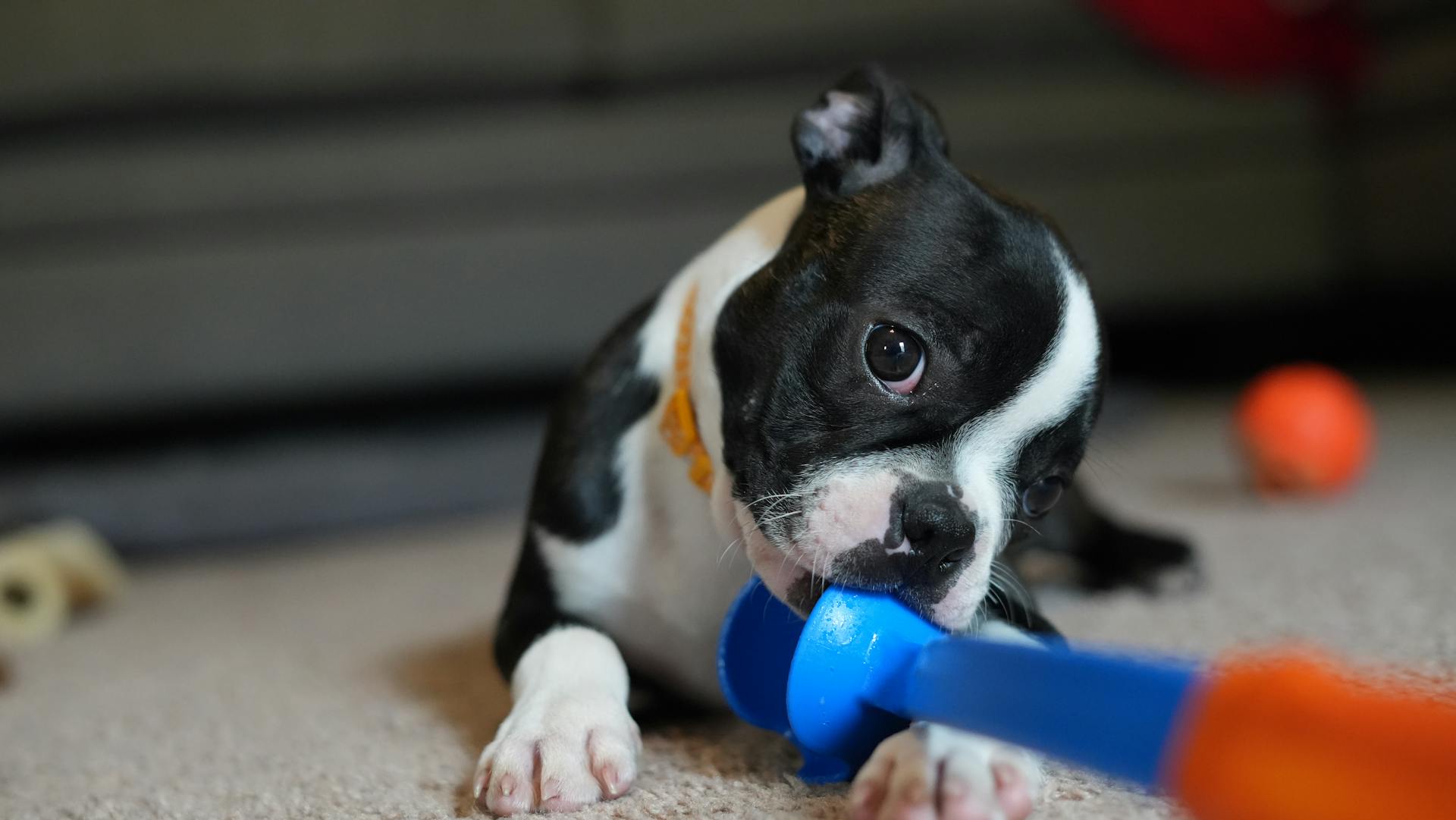
Breeders selectively bred Judge with a small, white, bulldog-type female to create a small, friendly companion dog. This selective breeding process led to the development of the recognizable traits and smaller size we know today.
The Boston terrier breed was officially recognized by the American Kennel Club in 1893, and it's a hometown favorite, being the mascot of Boston University since 1922. They are also the official dog of the state of Massachusetts.
If you're looking to add a Boston terrier to your family, you can expect to pay between $600-$1,200 for a puppy from a reputable breeder.
See what others are reading: Tiny Yorkshire Terrier Puppy
Related Topics
If you're considering bringing an adult Boston terrier into your home, you might also want to think about their exercise needs. Adult Boston terriers require daily walks and playtime to stay happy and healthy.
They're a relatively small breed, but they can be prone to obesity if they don't get enough physical activity. A 30-minute walk per day is a good starting point.
Boston terriers are known for their affectionate nature, and they make great companions for people who live in apartments or have small yards. They're relatively quiet, too, which is a bonus for city dwellers.
Their short coats require minimal grooming, but they do need regular nail trimming and ear cleaning to stay healthy.
Frequently Asked Questions
How big will a Boston Terrier get?
Boston Terriers typically weigh 10-25 pounds and stand about 16 inches tall. They have a compact, sturdy build with a short, smooth coat.
Is a Boston Terrier a good house dog?
Boston Terriers are excellent house dogs, thriving in smaller homes and apartments with regular exercise and attention. They make ideal family pets for those who can provide the love and interaction they crave.
Do Boston Terriers pick one person?
Boston Terriers are known to form strong bonds with one person, often their primary owner, and may be less affectionate with others. This unique attachment can make them a loving companion for the right person.
Do Boston Terriers bark a lot?
Boston Terriers tend to be relatively quiet, but individual dogs may still bark occasionally. Their calm nature is due to their original purpose as companions rather than working dogs.
Sources
- https://www.purina.co.uk/find-a-pet/dog-breeds/boston-terrier
- https://www.thesprucepets.com/boston-terrier-dog-breed-profile-4689861
- https://be.chewy.com/dog-breed/boston-terrier/
- https://www.petfinder.com/dogs-and-puppies/breeds/boston-terrier-dogs-puppies/
- https://www.istockphoto.com/photos/boston-terrier
Featured Images: pexels.com
